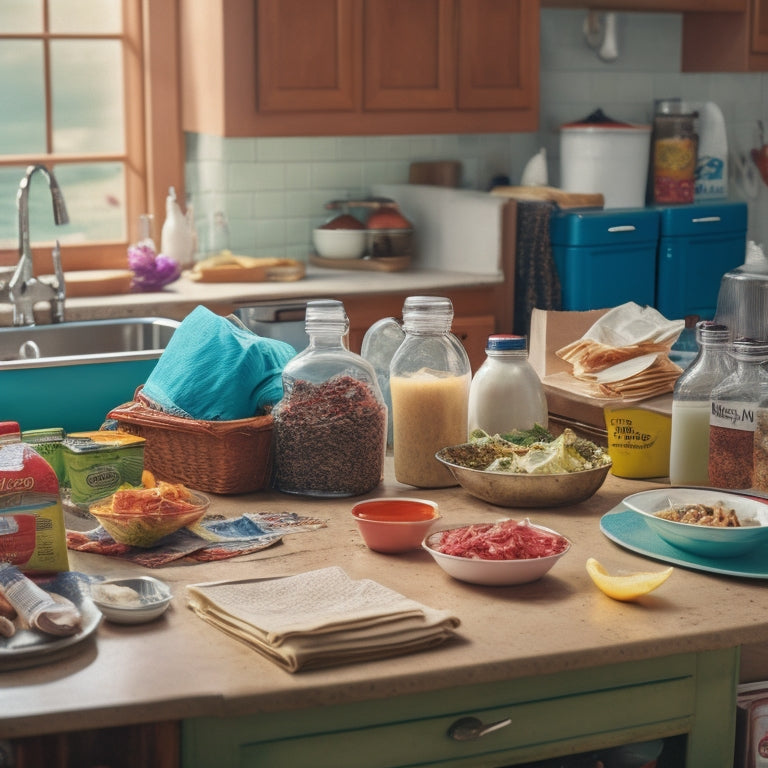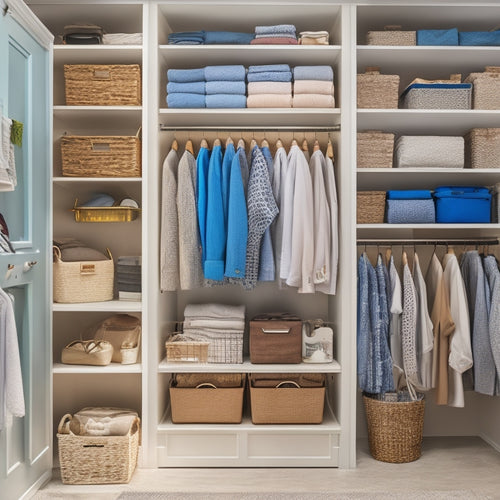
What's Holding You Back From a Spotless Kitchen?
Share
You're stuck with a chaotic kitchen due to a handful of common obstacles. One major roadblock is a cleaning schedule that's too rigid or unrealistic, leading to burnout. Another hurdle is a lack of storage space, causing cluttered countertops. Inefficient task assignments and poor communication can also hinder kitchen cleanliness. Additionally, tackling clutter hotspots, such as messy sink areas and junk drawers, can feel overwhelming. You might also be held back by inadequate cleaning tools or poor time management skills, leading to procrastination and inconsistency. Identify and address these common pitfalls, and you'll be on your way to a more organized, efficient, and spotless kitchen.
Key Takeaways
• Inflexible cleaning schedules and lack of realistic approach hinder spotless kitchen goals, leading to burnout and demotivation.
• Insufficient storage space and inefficient use of available space lead to cluttered countertops and disorganization.
• Inadequate task delegation and poor communication among household members result in inefficient cleaning and productivity losses.
• Ineffective cleaning tools and supplies compromise cleaning results, wasting time and effort.
• Unrealistic expectations and perfectionist tendencies prevent individuals from achieving a clean and functional kitchen that works for them.
Cleaning Schedules Gone Wrong
You've probably tried to stick to a cleaning schedule at some point, only to find that it's fallen apart within a week or two, leaving you right back where you started - surrounded by clutter and chaos. The problem isn't the schedule itself, but rather your approach to it.
You see, most cleaning schedules are designed to be followed to the letter, without any flexibility or room for error. But life gets in the way, and before you know it, you're skipping days, then weeks, and eventually, the whole thing falls apart.
To break this cycle, you need to adopt a more realistic approach. Identify areas where you can cut corners without compromising cleanliness, such as using cleaning shortcuts like multi-purpose cleaning products or focusing on high-traffic areas. This will help you stay motivated and avoid burnout.
Additionally, recognize that an unmotivated mindset is a major obstacle to maintaining a clean kitchen. Instead of beating yourself up over missed cleaning sessions, focus on getting back on track as soon as possible.
Lack of Storage Space Hurdles
Frequently, a lack of storage space in the kitchen hinders cleaning efforts, as cluttered countertops and overflowing cabinets make it difficult to maintain a sense of organization and control. You're not alone in this struggle, but it's time to take back your kitchen.
To overcome this hurdle, you need to get creative with your storage solutions.
Here are some space-saving ideas to get you started:
-
Install shelves, hooks, or a pegboard on walls or cabinets to maximize vertical storage
-
Invest in multi-functional appliances or gadgets that serve more than one purpose
-
Use stackable containers or baskets to store items like spices, oils, or cleaning supplies
- Designate a specific area for frequently used items, like a utensil organizer near the stove
Inefficient Task Assignments
Now that you've optimized your storage space, it's time to focus on the tasks that'll keep your kitchen spotless, and inefficient task assignments are likely hindering your progress. You've got the space, but without effective task delegation, you're still stuck with a messy kitchen. This is often due to a communication breakdown between household members or even within your own mind.
When tasks aren't clearly assigned, they can fall through the cracks, leading to inefficient workflows and productivity losses. You might find yourself redoing tasks or wasting time on unnecessary steps.
To overcome this, take some time to re-evaluate your task assignments. Identify the tasks that need to be done daily, weekly, and monthly, and assign them to specific individuals or time slots. Create a schedule and stick to it. This will help you stay on track, make sure that tasks are completed efficiently, and give you the power to maintain a spotless kitchen.
Kitchen Clutter Hotspots Remain
As you work towards a spotless kitchen, you'll likely notice that clutter tends to accumulate in specific areas. You'll want to tackle these hotspots head-on, and that starts with identifying the trouble zones - think counter clutter zones, messy sink areas, and junk drawer overflows.
Counter Clutter Zones
You likely have at least one counter clutter zone in your kitchen, where clutter tends to accumulate and persistently resist your best cleaning efforts. This zone can be a breeding ground for mess and disorganization, making it challenging to maintain a spotless kitchen.
Identifying and addressing the root causes of counter clutter is essential to achieving a clutter-free kitchen. Here are some common culprits to watch out for:
-
Appliance overload: Having too many appliances on your countertops can lead to clutter and make cleaning a nightmare.
-
Pantry organization: A disorganized pantry can spill over onto your countertops, creating clutter and chaos.
-
Lack of assigned storage: Without designated storage spaces, items tend to accumulate on countertops, creating clutter zones.
- Daily clutter accumulation: Failing to clean up after meals and daily activities can lead to clutter buildup on countertops.
Messy Sink Area
Behind the sink, crumbs, splatters, and soap scum accumulate, turning this high-traffic area into a clutter hotspot that demands regular attention to maintain a spotless kitchen.
You're not alone if you struggle to keep this zone tidy. However, with a few simple tweaks, you can transform this space into a model of efficiency.
Start by reassessing your dish organization. Are your dishes stacked haphazardly, or are they neatly arranged by type and size? Consider investing in a dish organizer or divider to keep your sink area clutter-free.
Next, take a hard look at your dish drying habits. Are you leaving dishes to air-dry, or are you using a dish towel that's seen better days? Invest in a sturdy drying rack that can hold multiple dishes at once, and make sure it's easy to clean and maintain.
Junk Drawer Overflow
Open your kitchen junk drawer and chances are you'll find a jumbled mess of mismatched takeout containers, expired coupons, and mystery cords. This cluttered space isn't only frustrating but also a breeding ground for disorganization.
It's time to take control and transform your junk drawer into a haven of organization. To achieve this, you need to adopt effective decluttering methods. Start by removing everything from the drawer and sorting items into categories. Be ruthless – if you haven't used it in the past year, it's probably safe to get rid of it.
Here are some organization solutions to help you maintain your newly decluttered drawer:
- Use dividers: Separate items into compartments to prevent clutter from building up again.
- Designate a 'maybe' box: Store items you're unsure about keeping in a box and set a deadline to revisit the decision.
- Keep frequently used items front and center: Store your most-used items in easy-to-reach locations.
- Schedule regular maintenance: Set aside time each month to maintain your organized junk drawer.
Inadequate Cleaning Product Tools
Cleaning effectively is hindered when your arsenal lacks essential tools, such as scrubbers, sponges, and microfiber cloths, which are designed to tackle tough messes. Without these tools, you're forced to rely on ineffective cleaning methods that leave your kitchen surfaces streaked and grimy. This not only wastes your time but also compromises product effectiveness.
For instance, using a subpar scrubber can render even the strongest cleaning products useless.
To take your cleaning game to the next level, it's vital to stock up on the right tools. Organize your cleaning supplies in a designated area, making it easy to access what you need when you need it. This will help you work more efficiently, achieving better cleaning results in less time.
Poor Time Management Skills
When you're struggling to keep your kitchen spotless, it's likely that your morning routine is rushed, leaving you scrambling to get everything done on time.
You might be sacrificing a few precious minutes of cleaning to get out the door, but it's a habit that can quickly add up to a messy kitchen.
Rushed Morning Routine
You're likely no stranger to rushing around the kitchen, quickly preparing breakfast, and hurrying out the door, all while feeling frazzled and behind schedule. This hurried morning routine can set the tone for a chaotic day, making it challenging to maintain a spotless kitchen.
To break this cycle, it's crucial to implement time-saving tips and efficient organization strategies.
Here are some morning routine hacks to get you started:
-
Prepare breakfast the night before: Chop veggies, cook proteins, or prep overnight oats to save time in the morning.
-
Designate a launch pad: Assign a specific spot near the door for keys, wallets, and bags to avoid last-minute scrambles.
-
Simplify your morning beauty routine: Streamline your skincare and hair care routines to save time and reduce clutter.
- Create a morning checklist: Write down essential tasks, such as feeding pets or taking medication, to make sure everything gets done before you head out the door.
Procrastination Habits Form
Every minute wasted on procrastination habits translates to a minute less spent on maintaining a spotless kitchen, and identifying and breaking these patterns is essential to develop better time management skills.
You're likely familiar with the feeling of overwhelm that comes with a cluttered kitchen, and it's time to take control. Identify the procrastination habits holding you back, whether it's scrolling through social media or getting caught up in a TV show.
Once you're aware of these habits, it's time to break them. Replace old patterns with new, productive ones. For instance, try setting a timer for 10 minutes and dedicating that time to cleaning up a small area of your kitchen. Use motivation boosters like putting on upbeat music or making it a challenge with a friend to stay on track.
As you form new habits, you'll start to notice a significant difference in your kitchen's cleanliness and your overall productivity. By breaking old patterns and forming new ones, you'll be well on your way to a spotless kitchen and a more efficient you.
Unrealistic Cleaning Expectations
Cleaning experts and social media often set the bar impossibly high, making you feel like a failure if your kitchen doesn't resemble a showroom. You're led to believe that a spotless kitchen is the norm, but in reality, achieving such a standard is out of reach for most people.
You're not alone in having perfectionist tendencies, and it's crucial to recognize that your kitchen doesn't have to be perfect.
Here are some things to keep in mind:
- Your kitchen is a functional space, not a display area.
- Time constraints and a busy lifestyle mean you can't dedicate hours to cleaning every day.
- Having high standards is commendable, but they can be unrealistic and lead to discouragement.
- You're not a failure if your kitchen isn't spotless; you're a normal person with priorities and limitations.
It's time to adjust your expectations and focus on maintaining a clean and functional kitchen that works for you.
Inconsistent Cleaning Routines
One major obstacle to achieving a spotless kitchen is the inconsistent cleaning routines that often plague your daily or weekly schedule. You may start strong, cleaning every day, but soon fall back into old habits, leaving your kitchen in disarray. To overcome this, you need to establish a routine that works for you and stick to it.
Effective time management is key to maintaining a consistent cleaning schedule. Set specific days and times for cleaning tasks, and make sure you have the necessary cleaning supplies on hand.
Here's a sample routine to get you started:
| Task | Frequency |
|---|---|
| Wipe down counters | Daily |
| Mop floors | Weekly |
| Clean oven | Bi-Weekly |
| Deep clean fridge | Monthly |
| Restock cleaning supplies | Monthly |
Frequently Asked Questions
How Do I Stay Motivated to Clean My Kitchen Every Day?
You stay motivated to clean your kitchen daily by creating a realistic cleaning schedule and breaking it down into manageable daily tasks. Decluttering tips will boost your motivation, so tackle one area at a time and celebrate small wins!
Can I Clean My Kitchen in Just 10 Minutes a Day?
You can clean your kitchen in just 10 minutes a day by using quick tips like focusing on high-traffic areas and efficient strategies like decluttering as you go, making the task manageable and empowering.
How Often Should I Deep Clean My Kitchen Appliances?
Daily dashes to dust and declutter are done, now dedicate downtime to deep cleaning your kitchen appliances. For flawless functionality, focus on frequent fridge and oven maintenance, scheduling scrub sessions every 1-2 months to keep them sparkling.
What's the Best Way to Clean Between Kitchen Tiles?
You tackle grout scrubbing with a stiff-bristled brush and baking soda paste, then seal those sparkling tiles with a tile sealant to repel stains and make future cleaning a breeze.
Can I Use a 'One-Touch' Rule for Kitchen Cleaning Tasks?
You can apply the "one-touch" rule to kitchen cleaning tasks by incorporating daily maintenance into your routine, simplifying tasks to save time, and establishing consistency to make cleaning a habit that sticks.
Related Posts
-

Budget-Friendly Closet Storage Hacks You Can Try
You can transform your cluttered closet into a serene oasis without breaking the bank by implementing a few ingenious...
-

Mastering Digital Decluttering With 5 Essential Tools
You're tired of feeling overwhelmed by your digital clutter, and it's time to take control. To master digital declutt...
-

Streamline Your Space: Efficient Home Systems
You're already surrounded by the tools and spaces you need to live more efficiently, but they're being held back by c...


